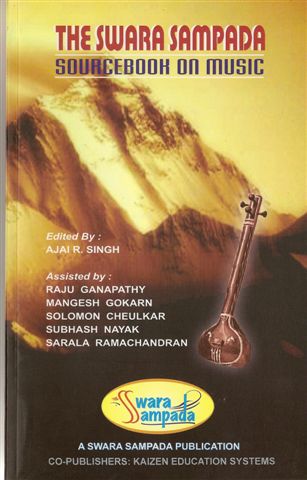|
|
||||||||||||||||||||||||||||||||||||||||||||||||||||||||||||||||||||||||||||||||||||||||
|
ISBN 81-901406-2-0
THE SWARA SAMPADA SOURCEBOOK ON MUSIC
Editor: Dr Ajai R Singh
Assisted by: Raju Ganapathy, Mangesh Gokarn, Soloman Cheulkar,
Subhash Nayak, Sarala Ramachandran
Published by Swara Sampada and Kaizen Education Systems
· ON BACK COVER OF BOOK
· FRONT COVER
· THE SWARA SAMPADA SOURCEBOOK ON MUSIC ISBN 81-901406-2-0
A SWARA
SAMPADA AND KAIZEN EDUCATION SYSTEMS PUBLICATION ………………………………………………………………… PREFACE THE SWARA SAMPADA SOURCEBOOK ON MUSICThe Swara Sampada Sourcebook on Music is an essential companion for all aspiring singers and
connoisseurs of music. It’s meant to guide and inspire potential singers, and demystify some commonly held beliefs.
It takes you step by step through the process of becoming a singer and shares some secrets held closely by good singers, but
seldom available to others.
In the Section The President Speaks His Mind, the author
Dr. Ajai Singh leads you by the hand and gives you practical tips on
becoming a singer. He discusses topics like How to select a song, the 100 times test for 100% success, How to protect your
voice, How to develop stage presence, How to Emote while singing, Lyrics, Diction, Classical Base, Music and Nature etc.
In the section The Science of an Art called Music, co-author
Raju Ganapathy discusses technical details of music that is essential
knowledge for all aspiring singers.
In the Section ABC of Music, co-author Mangesh Gokarn shares his invaluable insights into singing, which has helped a number of his students of music succeed.Ashok Sahasrabuddhe, voice culturist, in a guest article, discusses how to enjoy listening to music in his piece Listening, Hearing and Enjoying Listening.In the Final section on Songs and Scale, co-author Soloman Cheulkar, who has been giving orchestration for a number of years, shares his painstakingly compiled
original scales of Hindi film songs with you. This is not available in any other book I know of. It will be an invaluable
addition not only for new, but even established stage singers, and even orchestra players, who can refer to it during their
rehearsals.
Subhash Nayak has worked tirelessly over the cover designing, lay-out
and printing of The Swara Sampada Sourcebook on
Music, and Sarala
Ramachandran, Editor of Sargam, the Monthly Bulletin on Music of Swara Sampada, has
done the original editing of The President Speaks His Mind and The Science of an Art called Music, which now
appears here, albeit revised. She has also helped with the editing of the present work.
The Swara Sampada Sourcebook on Music is dedicated to the fond memory of Late Smt Padma Sitaram, an accomplished Carnatic vocalist and bhajan singer, and mother of Swara Sampadite Mr. Ganesh Iyer.
The Swara Sampada Sourcebook on Music should prove to be a boon to all aspiring singers, music lovers,
and an invaluable companion to music teachers and orchestra conductors too.
EXCERPTS FROM THE BOOK
The 100 Times Test for 100% Success
When people come up to sing on stage or before others, they are much concerned about
two very valuable things. One is their music book and the other their spectacles. They wear the latter, dig their heads into
the former and sing, blissfully unaware of a wide appreciative audience waiting to establish eye-contact with them, to enjoy
with them, to smile with and clap for them. After finishing, they close their book and remove their spectacles with a great
sense of relief! Thank God, it's over! That's their feeling, or something to that effect. And then the complaint is, the audience
is not appreciative, today my voice is not upto its mark, there is some difficulty with the sound system, the musicians did
not play the interludes well. That's why the song fell flat. Although, mind you, the voice may be good, and everything else
may be in order.
What was missing? A very significant factor, that is the essence of a live performance.
The rapport of souls was missing. The symphony between the heart of the singer and that of the audience was not established.
Because the singer was so busy looking into the book, he/she had no time to look into the eyes of his/her audience. The heart-strings
could not be tugged at. How could they? If I speak the most loving words to you and speak them before you, but looking down
or the other way, you will obviously not believe they are meant for you. You'd probably believe they are for someone on the
side, or down below. And you cannot be blamed for it, can you?
The singer must look up at his audience. He must smile at them. He must look into their
eyes. He must watch their faces as they feel happy, or sad or excited, or pensive. But for that he has to have his eyes away
from his book. He must know the lyrics of the song by heart.
How does one do so? The procedure is very simple. But the simplest of things are often
difficult to do for most people. Let this paradox not be applicable to you. The procedure is what I call the 100 times test.
1) First of all, the lyrics of the song must be perfectly written down with you. You
need to hear a song at least 5 times for
|
||||||||||||||||||||||||||||||||||||||||||||||||||||||||||||||||||||||||||||||||||||||||
|
Enter supporting content here
|
